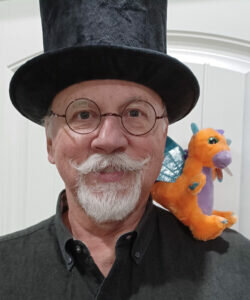Doug Cook is driven by passion. It’s something he’s learned about himself since becoming a math and science tutor at ProLiteracy member program, Center of Hope, in Parker County, Texas, four years ago. Volunteering his time twice a week, Doug finds ways to engage his students, so they gain the skills they need to pass the GED Math and Science tests. He even taught math to one reluctant student by tapping into the student’s scientific interest in stars. Together, they built their own equipment, including an equatorial mount to follow the equator, and met on several clear nights to map and track a few different stars.
Meet Doug Cook.
The Basics
ProLiteracy: How long have you worked with Center of Hope?
 Doug Cook: I began in January 2019. So just a bit over 4 years.
Doug Cook: I began in January 2019. So just a bit over 4 years.
PL: Why did you decide to teach adults?
DC: My wife Pat got me started. She already volunteered at the Center of Hope doing data entry and meal prep, and she wanted my assistance one day. While helping prepare and serve meals, the Education Coordinator Pat Johnson heard I was a nerd and asked if I was interested in math tutoring. I hesitantly said yes—not knowing what I would be getting myself into. I had tutored my wife in college, and others throughout my life, but working with those trying for their GED had me concerned whether I could dig deep enough to understand the needs of those students. I told myself this could be a “human adventure” and leapt in.
PL: What do you teach (e.g., basic literacy, high school equivalency, English as a second language, citizenship, workforce readiness) and in what setting?
DC: I prepare students for acquiring their GED (high school equivalency) by tutoring them in math and science. I prefer one-on-one tutoring. The individual student can accelerate their progress when they have the full attention of a mentor. Otherwise, many students are often embarrassed by their supposed lack of education and wide variation in life experience (age, economic status, amount of educational background, etc.), which can deter them from classroom participation. Answers can be “wrong” in math and science, and this is scary to many people. A diverse group of students is an advantage in the humanities, and the answers are often gentler on your ego.
About Your Experience
PL: What have you learned about yourself by working with students?
DC: My love of passion! Being passionate is exciting to yourself and others. Passion is a basic ingredient in a fulfilled life. Volunteering (focusing on others and giving of yourself with no expectation of reward) is another.
PL: Tell us about a favorite/impactful/memorable teaching experience.
DC: I have two. The first is when my student tells me that I make learning fun. Fun is how we learn. Look at nature, and watch all young animals play to learn what they need to survive. When I’m told that I make learning fun, then I tend to believe the students are learning. The second memorable experience is when a previous student contacts me from college or a job to thank me for my effort. Success!
PL: How do you keep students motivated?
DC: Passion! Tutors need to be passionate about what they teach. Students can see the subject as a reflection of their instructor. A dull and boring teacher makes for a dull and boring subject. A lively and energetic teacher brings a subject to life, and the student looks forward to your time together. The tutor must also be well-versed and knowledgeable in the subject being taught. If you come to a portion of a subject that you don’t know well, tell your student that you are learning this together. Part of what we teach is how to learn and not just facts and information. Don’t be overly authoritative on the subject.
How do you bring passion to your session? Emotionally prepare yourself before your session to be positive and energetic. Think about who is your student and what are his or her needs. Determine what tutoring style (humorous, intense, matter of fact, slowly-does-it, etc.) works well for your student. Be relaxed and honest so that the student isn’t tense. Converse and listen to the student, and don’t teach at them. Be interested in your student. Some students have had bad experiences in school (this is especially true in math where they might have been humiliated—hopefully unintentionally—by the teacher or teased by students) if they had to work on a math problem in front of others. These students often need to tell you about their bad experience to overcome it and to assure them that it will not happen with you. Listen, be kind, and care. Oh! Don’t forget. Have some fun.
The Other Stuff
PL: Name someone who inspires you.
DC: My son Trent inspires me. He is passionate about the whole world. He wants to make the world better for everyone and everything in it. I learn more from him than anyone.
PL: Where would you go on your dream vacation?
DC: Alaska or northern Canada to see the Aurora Borealis.
PL: What is your favorite book of all time?
DC: Two of Lewis Carroll’s books. Alice’s Adventures in Wonderland and Through the Looking-Glass. Lewis Carroll reimagined the world through innocent and questioning eyes. He was a mathematics don at Oxford University in England. The changing nature of mathematics in the mid 1800s heavily influenced his writing, as regards the jumbled reality of the stories and the math problems embedded within.
PL: Are you reading anything now? If so, what?
DC: I am reading Legends & Lattes by Travis Baldree (Tor Books), which is a 2022 Nebula Award finalist. This is a fantasy novel about the results of being kind to others.
Instructor Spotlight is a monthly feature on the ProLiteracy website and blog. Nominate an outstanding instructor from your program to be featured!